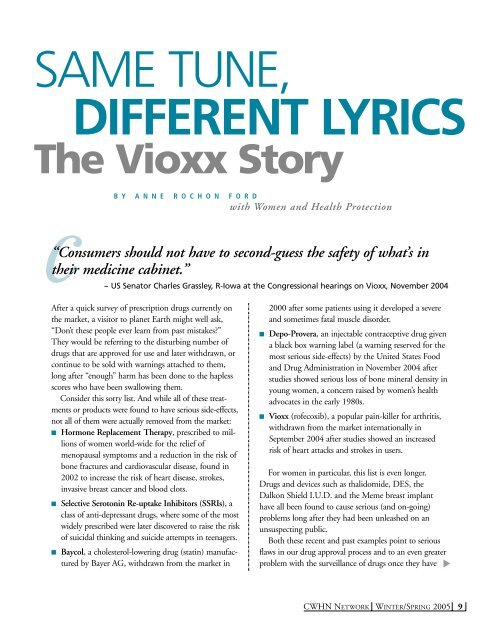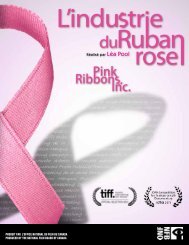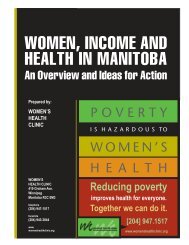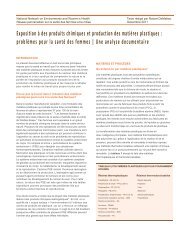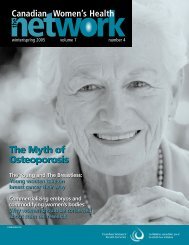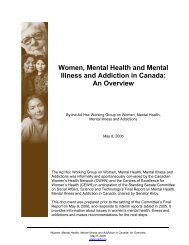NETWORK WIN00 - Canadian Women's Health Network
NETWORK WIN00 - Canadian Women's Health Network
NETWORK WIN00 - Canadian Women's Health Network
You also want an ePaper? Increase the reach of your titles
YUMPU automatically turns print PDFs into web optimized ePapers that Google loves.
SAME TUNE,<br />
DIFFERENT LYRICS<br />
The Vioxx Story<br />
B Y A N N E R O C H O N F O R D<br />
with Women and <strong>Health</strong> Protection<br />
c“Consumers should not have to second-guess the safety of what’s in<br />
their medicine cabinet.”<br />
~ US Senator Charles Grassley, R-Iowa at the Congressional hearings on Vioxx, November 2004<br />
After a quick survey of prescription drugs currently on<br />
the market, a visitor to planet Earth might well ask,<br />
“Don’t these people ever learn from past mistakes?”<br />
They would be referring to the disturbing number of<br />
drugs that are approved for use and later withdrawn, or<br />
continue to be sold with warnings attached to them,<br />
long after “enough” harm has been done to the hapless<br />
scores who have been swallowing them.<br />
Consider this sorry list. And while all of these treatments<br />
or products were found to have serious side-effects,<br />
not all of them were actually removed from the market:<br />
■ Hormone Replacement Therapy, prescribed to millions<br />
of women world-wide for the relief of<br />
menopausal symptoms and a reduction in the risk of<br />
bone fractures and cardiovascular disease, found in<br />
2002 to increase the risk of heart disease, strokes,<br />
invasive breast cancer and blood clots.<br />
■ Selective Serotonin Re-uptake Inhibitors (SSRIs), a<br />
class of anti-depressant drugs, where some of the most<br />
widely prescribed were later discovered to raise the risk<br />
of suicidal thinking and suicide attempts in teenagers.<br />
■ Baycol, a cholesterol-lowering drug (statin) manufactured<br />
by Bayer AG, withdrawn from the market in<br />
2000 after some patients using it developed a severe<br />
and sometimes fatal muscle disorder.<br />
■ Depo-Provera, an injectable contraceptive drug given<br />
a black box warning label (a warning reserved for the<br />
most serious side-effects) by the United States Food<br />
and Drug Administration in November 2004 after<br />
studies showed serious loss of bone mineral density in<br />
young women, a concern raised by women’s health<br />
advocates in the early 1980s.<br />
■ Vioxx (rofecoxib), a popular pain-killer for arthritis,<br />
withdrawn from the market internationally in<br />
September 2004 after studies showed an increased<br />
risk of heart attacks and strokes in users.<br />
For women in particular, this list is even longer.<br />
Drugs and devices such as thalidomide, DES, the<br />
Dalkon Shield I.U.D. and the Meme breast implant<br />
have all been found to cause serious (and on-going)<br />
problems long after they had been unleashed on an<br />
unsuspecting public.<br />
Both these recent and past examples point to serious<br />
flaws in our drug approval process and to an even greater<br />
problem with the surveillance of drugs once they have<br />
▲<br />
CWHN <strong>NETWORK</strong> WINTER/SPRING 2005 9


